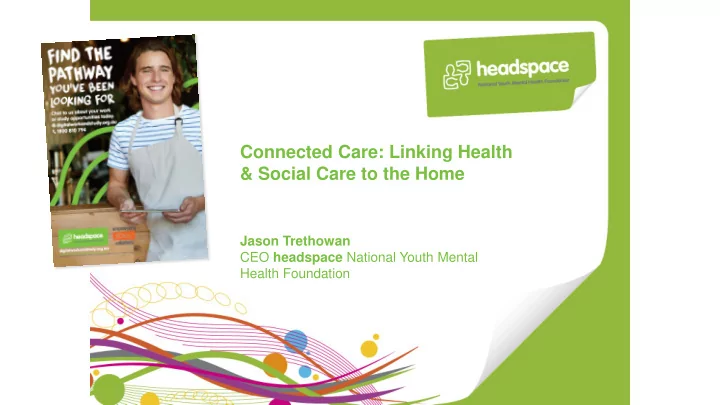

Connected Care: Linking Health & Social Care to the Home Jason Trethowan CEO headspace National Youth Mental Health Foundation
Key words driv ivin ing this is presentation • Loneliness • Relationships • Distress • Educational attainment • Social & economic participation • Social connectedness • Isolation • Disclosure
When it it comes to opportunities not every rything we offer is is for all ll people.
Mental l Healt lth: One of many natio ional challe llenges • 32% of Australians (16-64) with a self reported mental illness are not participating in the labour force (that is they are neither employed nor looking for work), compared to 17% without a mental illness. • 30% of the 820,00 Australians receiving a Disability Support Pension in 2011 had a mental illness. • Unemployment, Mental Health & Digital Health
Face to Face services are important but not enough. They need to be backed up by digital platforms to engage young people and increase help seeking behaviour
Streams eheadspace.org.au
eheadspace registrations 35,000 30,000 25,000 20,000 15,000 10,000 5,000 0 2012 2013 2014 2015 2016 33,000 registrations & over 80,000 occasions of service in 2016
Prio ior help lp-seeking eheadspace Just over half of eheadspace clients report that they have sought mental health support in the past (prior to their first use of eheadspace)
Who is using eheadspace? peak age of presentation 15 to 17
eheadspace - key features • Daily service from 9am – 1am AEST • Webchat (dominant) • Phone • Email (and recently SMS) • Credentialed mental health clinicians (approx. 80) – Treatment focused – Extensive client follow up – Regularly works with high complexity – Nation wide coverage
Service Delivery - Webchat dominant for young people - Phone preference for family
Service demand by hour of the day
Reasons Why Young People Present to headspace • Problems with how I feel (69.4%) • Problems with relationships (8.5) • Problems with School or work (8.3%) • I was made to come (8%) • Other (9.8%) • Key Message: Health Care is not always about a health care intervention
Digital Work and and Study Service World first Digital Vocational Service • Employment Assistance • Education/Training Assistance • Career Planning
Why • Gaps in existing employment and career services for young people with mental health issues • Young people who access headspace services have a significantly higher chance of being disengaged in work and study . • Work and study can contribute to mental health recovery and resilience. What • 2 year funded Pilot (finishes in June 2018) • 720 Young People Supported • Referral from headspace Regional Centre's and eheadspace .
Approach • Digital Platform that allows a timely response and broad reach (anywhere anytime) • Early Intervention -Invests time at the early stages of disengagement. • Integrated with clinical care • Voluntary (and no eligibility restrictions) • Individually tailored and flexible • Intensive (small caseloads of 20 pp) Clos losely ali aligned to th the In International l evid vidence bas ased In Individ idual l Plac lacement Su Support Model
Interventions • Intensive One on One support • Webinar Series – speak to industry • Mock Interviews • Work Experience & On-Hire Placements • Website Development - Resources and Tools • Group Chats
Fliers, Posters and Wallet Cards
Connected Care: Linking Health & Social Care to the Home Jason Trethowan CEO headspace National Youth Mental Health Foundation
Recommend
More recommend